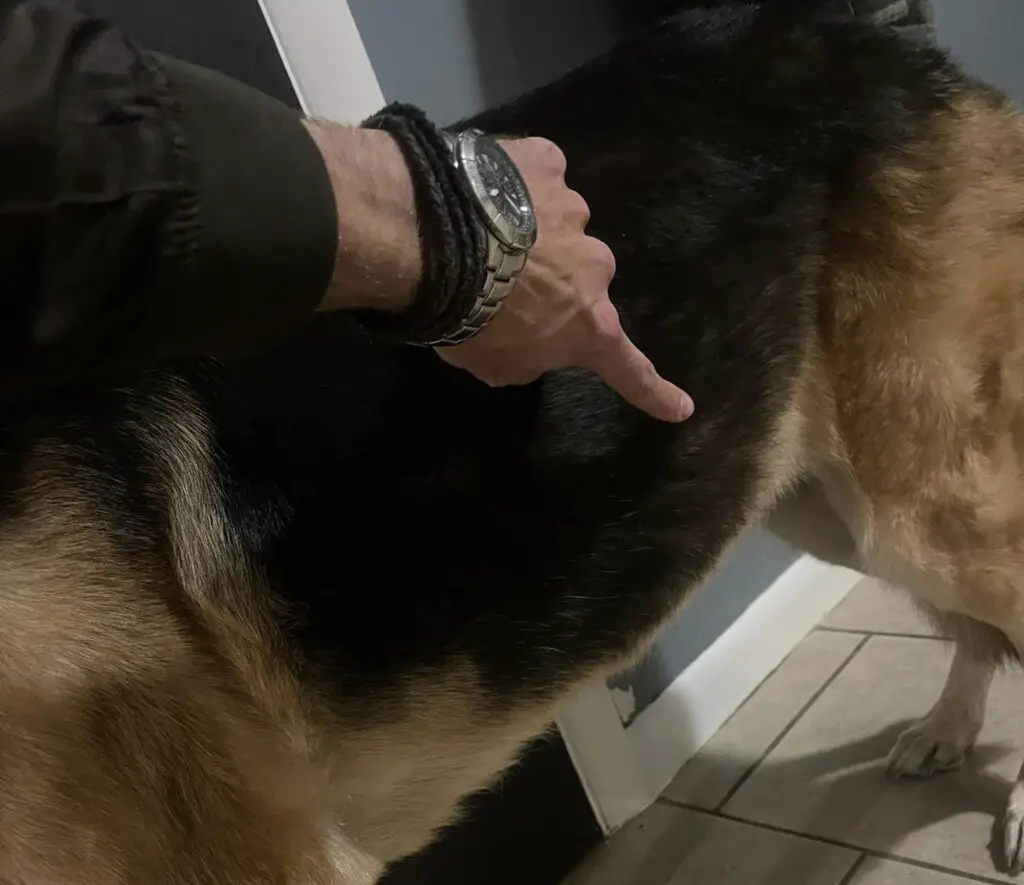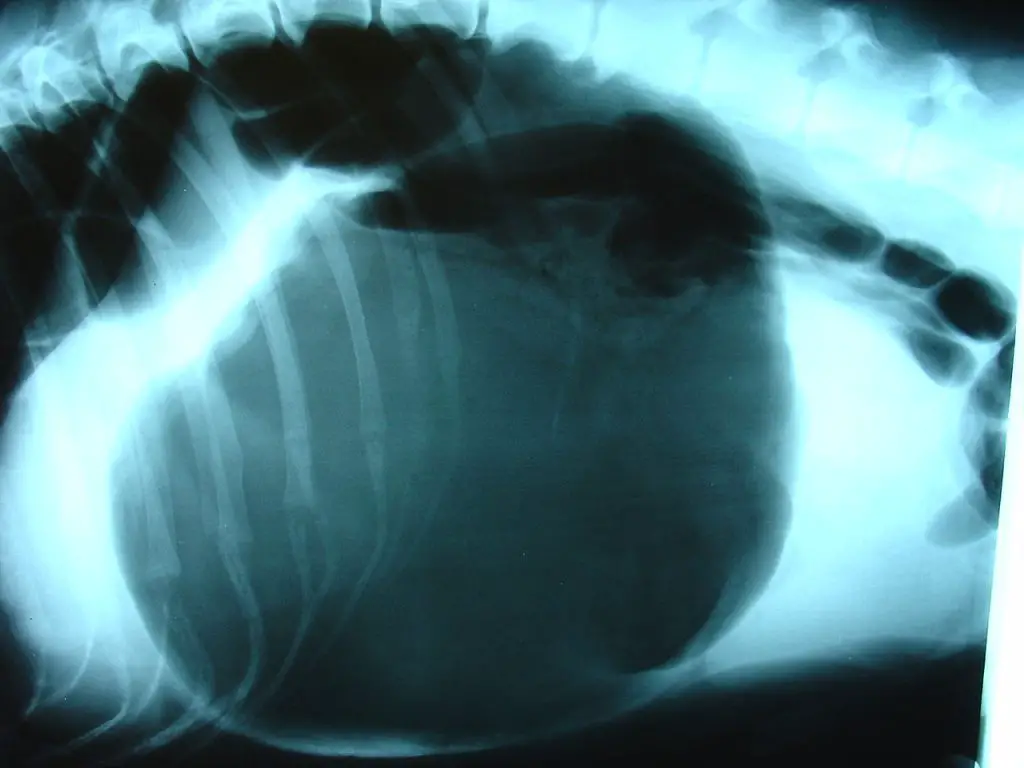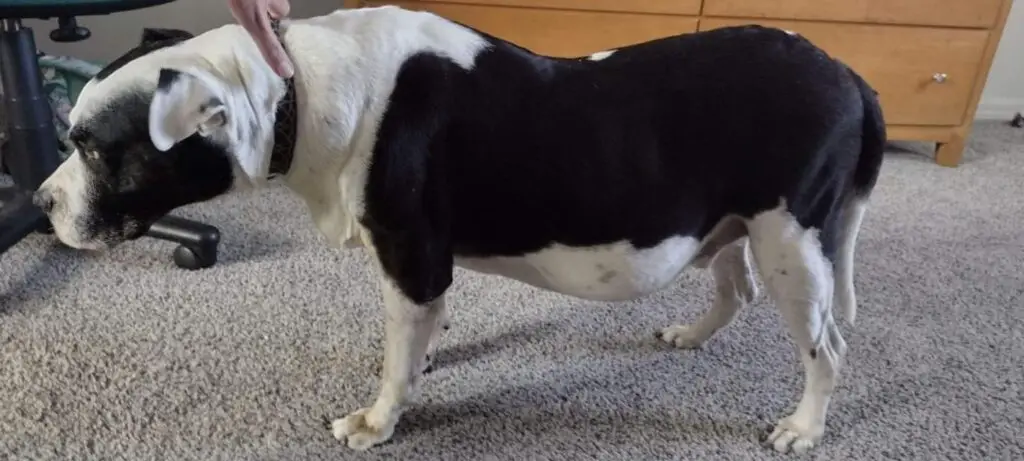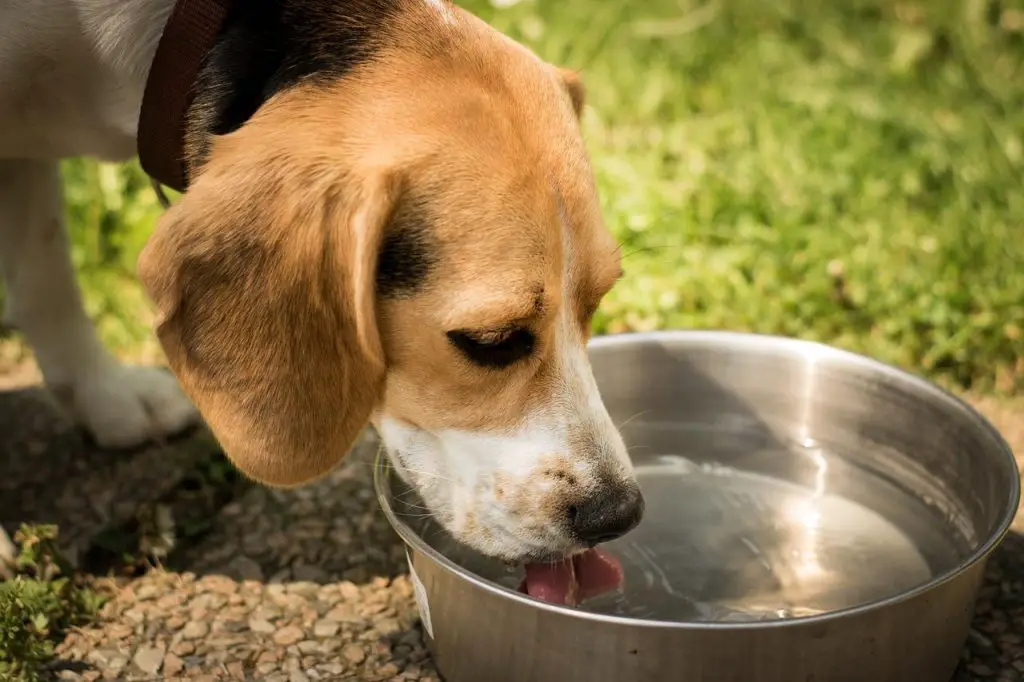If you are the owner of a dog that has been diagnosed with bloat, you may be wondering if your dog will continue to drink water. Bloat is a serious condition that can be life-threatening, so it is important to understand all of the symptoms and treatment options.
In this blog post, we will discuss bloat in dogs and whether or not they will continue to drink water. We will also provide tips for preventing bloat in your furry friend.
Key Takeaway
- Bloat in dogs, also known as Gastric Dilatation-Volvulus (GDV), is a severe and life-threatening condition where the dog’s stomach fills with gas and can twist on itself, causing discomfort, difficulty breathing, potentially leading to the death of the animal if not treated immediately.
- Bloat in dogs is commonly caused by the dog’s anatomy, particularly in large, deep-chested breeds, and can be triggered by factors such as eating large amounts of food at once, exercising immediately after eating stress, and certain gastrointestinal diseases.
- Warning signs of bloat in dogs include a swollen, hard belly, restlessness, excessive drooling, attempts to vomit without success, rapid breathing, pacing, and signs of distress such as whining and appearing anxious.
What Is Bloat In Dogs

Bloat in dogs, also known as gastric dilatation-volvulus (GDV), is a serious and potentially life-threatening condition.
Bloat in dogs is caused by a buildup of gas, fluid, and sometimes solids in the stomach causing it to become distended and twist, cutting off the blood supply to other organs.
This can lead to shock or even death if not addressed quickly by medical professionals.
Dietary changes such as smaller meals eaten more frequently, avoiding excessive exercise after eating, and providing access to fresh water at all times may help reduce a dog’s chance of developing bloat in some cases.
Will a Dog With a Bloat Continue To Drink Water
Will a Dog With a Bloat Continue To Drink Water?

Yes, a dog with bloat will continue to drink water. However, it is important to monitor their intake and consult with a veterinarian if they are showing signs of distress. Dogs with bloat may be at risk for developing GDV (gastric dilatation-volvulus), which is a life-threatening condition. Therefore, it is important to seek medical attention if your dog is displaying any symptoms of bloat.
Bloat is a condition that can affect dogs of any age, breed, or size. It occurs when the stomach fills with gas and/or fluid, and can put pressure on other organs. If left untreated, bloat can be fatal.
There are several things that can cause bloat in dogs, including eating too much, drinking too much water after exercise, eating from raised food bowls, and stress.
Some dog breeds are more prone to bloat than others. These include deep-chested breeds such as Great Danes, Basset Hounds, Boxers, and Doberman Pinschers.
When a dog bloats, its stomach fills with gas and/or fluid. This puts pressure on the stomach walls and can cause the dog to feel very uncomfortable. Drinking water can help to release some of the pressure and make the dog feel more comfortable.
While it may seem counterintuitive to give a dog with bloat more liquid, it is actually helpful in most cases.
If you think your dog may be bloated, watch for the following symptoms: an enlarged or distended abdomen, restlessness, panting, drooling, retching, or dry heaving without producing vomit, weakness, and pale gums. If your dog displays any of these symptoms, call your veterinarian immediately says PetMD.
What Causes Bloat in Dogs
- Eating too much: Eating too large of a meal or consuming food quickly can cause the stomach to become bloated and a twisted stomach can result.
- Exercising after meals: Vigorous exercise soon after eating can increase the risk of bloat in dogs as it causes the stomach to move around and may cause it to become twisted.
- Genetics: Certain breeds that have deep chests, such as Great Danes, are more prone to developing bloat than others.
- Stress: Dogs that are overly stressed or anxious may be at an increased risk of developing bloat due to their elevated heart rate, which can lead to a twisting of the stomach.
- Age: Senior dogs are more likely to develop bloat than younger ones because their organs do not function as efficiently and their reflexes may be slower.
Warning Signs of Bloat In Dogs

- Abdominal distension or bloating. The stomach area of a dog with bloat may become enlarged, swollen, and tight.
- Restlessness or signs of discomfort. Bloated dogs may appear restless, shifting positions and trying to find comfort without any luck.
- Refusing food, water, or both. A dog with bloat may stop eating and drinking due to abdominal pain.
- Salivating excessively. Excessive salivation is often a sign of pain in dogs and can be associated with bloat symptoms.
- Difficulty breathing. As the stomach swells, it can impede the ability to breathe leading to labored breathing or even shallow breathing in some cases.
- Rapid heart rate. Dogs with bloat will have an increased heart rate as they attempt to cope with the condition and its symptoms.
- Pale gums.- Gums become pale when there is a lack of oxygen in the body which can result in bloating in some cases.
- Weakness and collapse. In more severe cases, bloated dogs might experience weakness and collapse due to shock caused by circulatory problems resulting from the condition’s effects on the body’s organs and systems.
Do Dogs Drink a Lot of Water If They Have Bloat?

No, dogs do not drink a lot of water if they have bloat. Bloat is a condition where the stomach fills with gas, food, or fluid, causing it to twist on itself. This can cut off the blood supply to the stomach and cause severe pain. Bloat can be life-threatening if not treated immediately. If your dog has bloat, it is important to seek veterinary care immediately.
There are a few reasons why dogs may not drink water when they are bloated. One reason is that they may be feeling nauseous and drinking water may make them vomit.
Another reason is that their stomach may be so full that drinking more water would make them feel even more uncomfortable. Finally, some dogs may be in so much pain that they don’t want to move or do anything that might make their pain worse.
Bloat can be a very serious condition for dogs and can even be life-threatening. It is important to know the signs and symptoms of bloat so that you can get your dog to the vet as soon as possible if they are showing any of them.
The most common sign of bloat is a distended abdomen. Your dog may also drool excessively and retch or gag, but not vomit.
Another common symptom of bloat is restlessness. A dog who is normally calm may pace back and forth or appear to be searching for a comfortable position.
This is because the distended stomach puts pressure on other organs, making it difficult for the dog to breathe or move comfortably.
Will a Dog With a Bloat Continue To Drink Water
Gastropexy Procedure For Dogs With Bloat
Gastropexy is a surgical procedure that helps to prevent bloat in dogs. During the surgery, the stomach is sutured to the abdominal wall, preventing it from becoming twisted and blocking off blood flow. The procedure takes approximately 30 minutes and requires anesthesia for your dog.
The advantages of performing a gastropexy include helping to reduce the risk of bloat occurring again in the future, as well as providing immediate relief during an emergency situation if your dog is showing signs of GDV.
Additionally, during a gastropexy, veterinarians may also be able to remove any surrounding adhesions that may have developed due to prior episodes of bloat.
It’s important to note that while the probability of bloat occurring again can be reduced with this procedure, it’s not 100% effective.
Other preventive measures such as avoiding large meals and exercising after eating should also be taken. Also, if you do decide to proceed with a gastropexy, make sure you discuss all potential risks with your veterinarian beforehand.
How Long Does Dog Bloat Last?
Dog bloat, or gastric dilatation-volvulus (GDV), is a serious medical condition that requires immediate treatment. If treated quickly and correctly, the average length of time for dog bloat to resolve is about 24 hours. However, if left untreated, it can be fatal in as little as a few hours.
The first step in treating bloat is to stabilize the dog’s shock. This is done by administering intravenous fluids and emergency medications.
Once the dog is stable, surgery may be necessary to decompress the stomach and turn it back into its normal position. In some cases, a gastropexy may also be performed to help prevent the stomach from twisting again in the future.
It’s important to note that even with treatment, there are risks associated with GDV, and not all dogs will make a full recovery. It’s best to take preventative measures such as avoiding large meals and exercising after eating to reduce your dog’s risk of developing bloat.
Will a Dog With a Bloat Continue To Drink Water
5 Ways To Prevent Bloat in Dogs
Bloat is a dangerous condition that can affect dogs of any age, size, or breed. If not treated immediately, bloat can be fatal. Here are five ways to help prevent bloat in your dog:
1. Smaller Meals More Often
Instead of one large meal, feed your dog smaller meals more often throughout the day. This will help to prevent them from over-eating and reduce the risk of bloat.
When a dog overeats, they are at a higher risk of developing bloat. Bloat is a condition where the stomach becomes bloated and twisted and can be fatal if not treated immediately.
By feeding your dog smaller meals more often, you can help to prevent them from overeating and reduce the risk of bloat. Additionally, this will also help to keep their energy levels up throughout the day.
So, next time you’re considering what to feed your furry friend, remember that smaller meals more often may be the best option for preventing bloat. And, it’s always a good idea to consult with your veterinarian before making any changes to your dog’s diet.
2. Water Available At All Times
Make sure your dog always has access to water and encourage them to drink it often. This will help keep them hydrated and may help to prevent bloat.
Water helps to prevent bloat in dogs by keeping the stomach from becoming distended. When the stomach is empty, it is more likely to twist. This can cause severe pain and even death. By feeding smaller meals more often, you can help keep your dog’s stomach full and reduce the risk of bloat.
3. Avoid Exercise After Eating
Letting your dog exercise immediately after eating can increase their risk of bloat. Try to wait at least an hour after they eat before taking them for a walk or letting them play.
If you are looking to prevent bloat in your dog, then you should avoid exercising them immediately after they have eaten. Bloat is a condition that can occur when a dog’s stomach fills with gas and puts pressure on other organs.
This can be extremely dangerous and even fatal, so it is important to take precautions against it. Walking or running your dog immediately after they eat can increase their risk of developing bloat, so it is best to wait at least an hour before taking them out for exercise.
By taking this simple precaution, you can help keep your dog safe and healthy.
4. Elevated Bowl
Feeding your dog from an elevated bowl can also help to reduce the risk of bloat. This is because it can help to prevent them from gulping their food too quickly.
Elevated bowls are great for preventing bloat in dogs because they help to keep the dog’s head higher than its stomach. This is important because it helps to prevent the dog from swallowing too much air, which can cause the stomach to become bloated.
Additionally, elevated bowls can help to reduce neck and back strain in dogs who eat from them. Finally, they also look really cool and make your dog feel like a VIP! So, if you’re looking for a way to help prevent bloat in your dog, an elevated bowl is a great option.
5. Watch Their Weight
There are several things you can do to help prevent bloat in your dog, but one of the best is to watch their weight.
Keeping your dog at a healthy weight will help reduce the amount of pressure on their stomach and make them less likely to experience bloat.
Obesity is a risk factor for bloat, so be sure to keep an eye on your dog’s weight. If they are carrying around extra weight, speak with your vet about the best way to help them slim down safely.
How To Treat a Dog With Bloat
- Remove food and water. Keeping your pup from ingesting any more food or water can help reduce the amount of enlargement in the stomach, as well as reduce pain.
- Elevate their head. Elevating their head with a pillow or blanket will help keep them comfortable and reduce their risk of shock.
- Monitor their vital signs. Pay close attention to breathing rate, heart rate, gum color, and temperature to gauge how the dog is responding to treatment/care.
- Administer medication. Administer anti-inflammatory drugs like Metacam to reduce inflammation associated with bloat, as well as other prescribed drugs that can provide relief from pain and symptoms related to shock.
- Contact a vet immediately. Immediately contact your veterinarian when you suspect that your dog is suffering from bloat, as it is an emergency condition that requires prompt medical attention.
- Follow-up care. Make sure to follow up with your vet after treatment for continued monitoring and treatment if necessary.
FAQs
Q: How can I tell if my dog has bloat?
A: Some signs of bloat in dogs include a distended or swollen abdomen, restlessness, pacing, drooling, unsuccessful attempts to vomit, rapid breathing, and signs of distress. If you suspect your dog may have bloat, it is crucial to seek veterinary help immediately.
Q: Can drinking water cause bloat in dogs?
A: Drinking water itself does not cause bloat in dogs. However, certain factors such as eating too quickly, exercising vigorously after meals, or consuming a large amount of water too quickly after a meal can contribute to the development of bloat. It is essential to monitor your dog’s water intake and manage their eating habits to reduce the risk of bloat.
Q: What should I do if I suspect my dog has bloat?
A: If you suspect your dog has bloat, it is crucial to seek immediate veterinary care. Do not attempt to treat the condition at home as it is a life-threatening emergency that requires prompt medical intervention.
Q: How is bloat treated in dogs?
A: The treatment of bloat in dogs typically involves stabilizing the dog’s condition, relieving the gas buildup in the stomach through a process called gastric decompression, and surgically correcting the twisted stomach if necessary. The exact treatment approach may vary depending on the severity of the condition and the dog’s overall health.
Q: Can bloat be prevented in dogs?
A: While it is not always possible to prevent bloat in dogs, there are several measures you can take to reduce the risk. These include feeding multiple smaller meals throughout the day instead of one large meal, using a slow feeder or puzzle toy to slow down eating, avoiding strenuous exercise immediately before or after meals, and monitoring your dog’s water intake.
Q: Are certain dog breeds more prone to bloat?
A: Yes, certain dog breeds are more susceptible to bloat. Large and giant breeds with deep chests, such as Great Danes, Saint Bernards, and Weimaraners, are at a higher risk of developing bloat. However, bloat can occur in any breed, so it is important to be aware of the symptoms and take precautions regardless of your dog’s breed.
Q: Can bloat in dogs be fatal?
A: Yes, bloat in dogs can be a life-threatening condition if left untreated. The twisted stomach can lead to tissue damage, organ failure, and shock. It is crucial to seek immediate veterinary care if you suspect your dog has bloat.
Q: Is bloat the same as gas in dogs?
A: No, bloat and gas in dogs are not the same. Bloat refers to the condition where the stomach becomes distended and may twist, causing a life-threatening situation. Gas in dogs, on the other hand, usually refers to excess gas production in the digestive system, which can cause discomfort but is not typically life-threatening.
In Conclusion
In conclusion, it is important to closely monitor a dog with bloat and make sure they are not drinking excessive amounts of water.
While giving small sips of water can help with hydration, too much water can actually worsen the condition and put additional strain on their already distended stomach.




